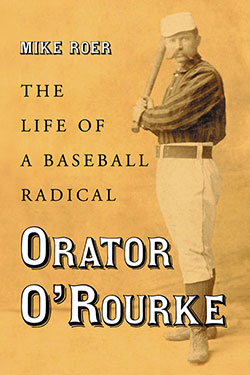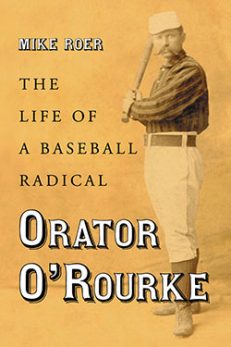Orator O’Rourke
The Life of a Baseball Radical
$35.00
In stock
About the Book
As a player, manager, team captain, umpire, owner and league president, Hall of Famer Jim O’Rourke (1851–1918) spoke for the players in the emerging game of baseball. O’Rourke’s career paralleled the rise of the game from a regional sport with few strategies to the national pastime. Nicknamed “Orator” for his booming voice and his championing of the rights of professional athletes, he was a driving force in making the sport a profession, bringing respectability to the role of professional baseball player.
From contemporary sources, O’Rourke’s own correspondence, and player files available through the National Baseball Library, a rounded portrait of Jim O’Rourke emerges. Quick to speak his mind, the outfielder played on nine pennant-winning teams, but his playing career was overshadowed by his work in organizing baseball’s first union. After his playing days ended, O’Rourke attempted to establish the Connecticut League, becoming the circuit’s president, secretary, and treasury. Though the league failed to fully materialize, his Bridgeport Victors did play several games and were one of the few racially integrated teams—a fact emblematic of O’Rourke’s efforts to change the national pastime. In those efforts, he attempted to wrest control of the game from the owners and empower the players. A carefully researched account of O’Rourke’s life and career, this biography also provides a behind-the-scenes look at the growth of the national pastime from the Civil War through the deadball era.
About the Author(s)
Bibliographic Details
Mike Roer
Format: softcover (6 x 9)
Pages: 342
Bibliographic Info: 88 photos, tables, appendices, notes, index
Copyright Date: 2006
pISBN: 978-0-7864-2355-2
Imprint: McFarland
Table of Contents
Preface 1
Prologue 5
1. Beginnings 7
2. Jim Joins the Club (1866–1871) 11
3. Middletown Mansfields (1872) 27
4. Boston Red Stockings (1873) 33
5. The Red Stockings in Great Britain (1874) 40
6. The Tools of Ignorance (1875) 51
7. Boston Red Caps (1876–1878) 60
8. Providence Grays (1879) 74
9. Return to the Boston Red Caps (1880) 83
10. Buffalo Bisons (1881–1883) 90
11. John O’Rourke Joins the Mets (1883) 106
12. National League Batting Champion (1884) 108
13. New York Giants (1885–1887) 117
14. O’Rourke at Yale Law School (1885–1887) 124
15. The Brotherhood (1886–1887) 128
16. The Color Line (1887) 138
17. Orations (1888) 141
18. The Giants Win the Pennant (1888) 145
19. The Baseball War (1889) 152
20. The World’s Series (1889) 162
21. Players’ League Giants (1890) 169
22. Return to National League Giants (1891–1892) 187
23. Washington Senators (1893) 191
24. National League Umpire (1894) 195
25. Bridgeport Victors (1895–1897) 203
26. New Home for the Bridgeports (1898–1900) 215
27. Defending the Minor Leagues (1900–1903) 220
28. The Bridgeport Orators (1903–1907) 231
29. The NAPBL (1907) 237
30. Hanging Up the Glove (1908–1910) 241
31. Baseball’s Elder Statesman (1911–1913) 248
32. The New England Baseball War (1913–1919) 253
33. The Baseball Wars: A Look Back 271
34. Epilogue 273
Appendix A: Jim O’Rourke’s Professional Statistics 277
Appendix B: Evolution of the Rules of Baseball 279
Appendix C: The Bat 295
Appendix D: The Ball 296
Notes 300
Bibliography 325
Index 331
Book Reviews & Awards
“thoroughly researched…superb”—Sports Collectors Digest; “those of us who know nineteenth-century baseball history well can still learn a lot from Orator O’Rourke. …[A] life worth knowing about and a book worth reading”—Nine; “of great interest…prodigiously researched”—Edward Achorn, Providence Journal; “marvelously researched and well written. The reader sees clearly that baseball, as always, reflects the spirit of its time.”—Larry Levine, Quinnipiac University.





